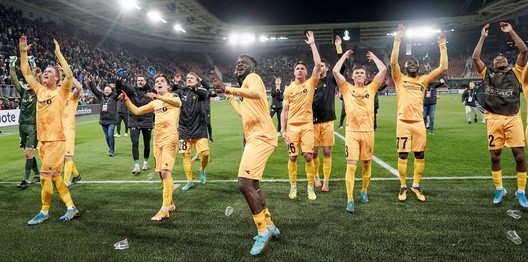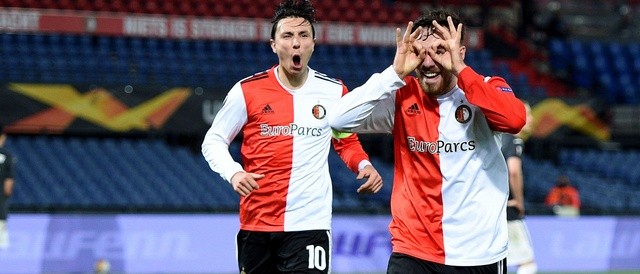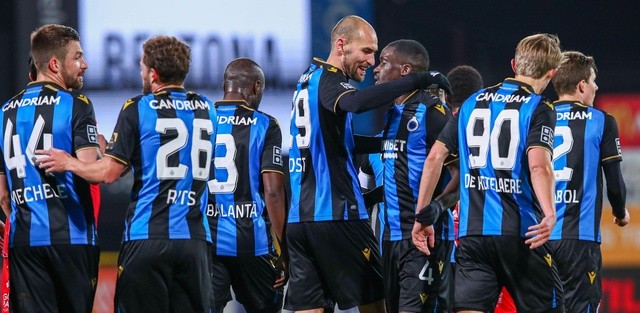Analysis: Bodø/Glimt’s strong identity and strategy have turned on-the-pitch success into financial success

Alamy
Of all clubs outside the top-five leagues, Bodø/Glimt have seen the highest percentage growth in turnover since 2018.
Bodø/Glimt have charmed most of the European football world with their underdog success story in the Europa Conference League, which was one of the main reasons for creating this new European tournament.
Why it matters: Bodø/Glimt’s clear identity and strategy have kept the business highly profitable in a fast-growing environment.
The perspective: Success on the pitch is not always guaranteed to translate into financial success off the pitch.
30 March 2022 - 12:32 PM
After more than a decade of struggling between the second tier and first tier in Norway, Bodø/Glimt were promoted back to the Norwegian top tier in 2018, and since then everything has developed quickly for the Norwegian side.
After finishing as runners up in 2019, they have now won two consecutive domestic titles and managed to position themselves as a top team in Norwegian football in only a few years.
On top of the domestic success, the small Norwegian team have triumphed in the newly-founded Europa Conference League where they have beaten the likes of José Mourinho’s AS Roma 6-1 in the group stage, eliminated both Celtic and AZ Alkmaar in the knockout rounds and are now facing AS Roma again in the quarter finals.

Norwegian champions present remarkable commercial growth via UN’s Sustainable Development Goals
19 August 2021 - 12:52 PM
These big wins have had everyone talking about the little Norwegian team that outperforms on the pitch relative to its financial size. Off The Pitch has looked at Bodø/Glimt’s financials to see whether the success on the pitch has translated into a healthy financial situation too.
European adventure made revenue surge
The newly-founded Europa Conference League is a big opportunity for teams from smaller nations to play on a European stage, which also means an additional stream of income for these smaller teams that struggle to qualify for the Champions League and Europa League.
In 2020, Bodø/Glimt were close to qualifying for the Europa League but lost 3-2 to AC Milan in the third qualifying round. However, Bodø/Glimt’s players showed their talent, which resulted in Milan later buying Jens Petter Hauge for €4.8 million - a sale which became the biggest in the club’s history.
In 2021 they entered the Conference League after losing in the first qualifying round for the Champions League.
Bodø/Glimt have grabbed the Conference League opportunity with great results, which they clearly have monetised off the pitch, with their revenue surging in 2021 mainly due to the European participation.
Sixty per cent of the €10.2 million broadcast revenue in 2021 came from taking part in Europe, while 35 per cent of total matchday revenue was generated by European games.
The income from matchdays in 2021 has not been impacted by the pandemic to the extent of most other teams’ 2021 figures across Europe, which is due to the Norwegian season following the full calendar year 2021 - when the restrictions were less severe than in 2020.
Proportional growth strategy
Because Bodø/Glimt’s financial statement follows the calendar year, the hefty revenue from the club’s success at the group stage of the Conference League is visible in the revenue numbers, but the potentially even higher revenue from their advancement from the knockout stages so far in 2022 is not included.
Revenue from these matches and the future qualification for the Champions League 2022/2023 season could increase Bodø/Glimt’s 2022 figures substantially.
The success on the pitch by winning the domestic title and participating in Europe has also increased wages, which are up 102 per cent from 2020 to 2021.
Despite this huge rise in wage expenses, the wages-to-revenue ratio has been declining year after year, which shows that turnover has grown faster. This indicates the club has a proportional wages structure, which secures the profitability of the side.
Being able to decrease the wages-to-revenue and debt-to-equity ratios during the pandemic underscores a healthy financial situation. The lower debt-to-equity ratio is mainly due to higher cash holdings, which are up 80.5 per cent from 2020 to 2021.
The proportional growth strategy and higher profit on player sales have also increased the club’s profit margin a lot since coming back to Eliteserien.
Bodø/Glimt’s profitability numbers beat benchmark
In Bodø/Glimt’s first season back in the top tier in 2019 they had a turnover of €6.6 million, which was the second-lowest turnover of all clubs in the Eliteserien.
Meanwhile, Rosenborg BK participated in the Europa League and had the highest turnover in 2019, which was more than four times as high as that of Bodø/Glimt. In 2021, Bodø/Glimt have surpassed all other big Norwegian clubs and now have the highest turnover, which shows just how much European success means for teams in smaller leagues.
Bodø/Glimt have increased their turnover by 177 per cent since 2018 - the highest percentage increase by far in that time span among all clubs in Europe outside of the top five leagues that have stated their 2021 financials.
No other club outside the top five leagues have increased their turnover by more than 100 per cent. This big increase has ranked the club’s revenue above all other Norwegian clubs - and above a lot of comparable big Dutch and Scandinavian teams.
It can be a hard task to keep a fast-growing business profitable, but Bodø/Glimt seem to have made a proportional growth strategy work, resulting in a €3.9 million profit after tax in 2021.
All their profitability numbers outshone all the chosen benchmark clubs’ numbers, and Bodø/Glimt have increased their profit figures year after year since 2018, despite the negative impact of the pandemic and not having the highest turnover of the clubs.
Beating the benchmark clubs is another example of how Bodø/Glimt have managed to go from a second-tier team in Norway to trumping big historical clubs on and off the pitch, which indicates that they have succeeded in monetising from their success on the pitch.
But it is not only in their successful 2021 season that the club have outperformed all benchmark clubs. Average profit-margin numbers between 2019 and 2021 reveal that Bodø/Glimt are not just a one-season wonder, but have managed to achieve the highest average profit margin in the last three years of all the benchmark clubs.
This shows they are also sustainable in the long run. The side’s average profit margin of 23.6 per cent is by some distance the highest figure of all Norwegian and comparable European clubs.
2022 outlook
The revenue from Bodø/Glimt’s advancement in the knockout stages of the Conference League and the future qualification matches for the Champions League 2022/2023 season will most likely increase the club’s 2022 revenue figures substantially.
So far, revenue in 2022 from the knockout faces in the Conference League is approximately €1.9 million, which will double if they beat AS Roma to reach the semi-finals.
The club also sold two of their biggest stars - Erik Botheim and Patrick Berg - in the January transfer window of 2022 to Krasnodar and Lens respectively for a combined €9.5 million after the players showed off their capabilities on the European stage.
The opportunity that teams in smaller leagues get to display their talented players on the big international scene is another example of advantages the Conference League affords small teams.
Bodø/Glimt’s ongoing success, despite selling their best players, shows that the club’s clear identity and strategy is paying off.
The fans want the local northern Norwegians to play, and the average squad age is only 23.8 years while 80 per cent of the squad consists of Norwegian players. They aim to have 40 per cent of their squad from northern Norway and 15 per cent of playing minutes for local players, which is very rare in modern day football, but it draws comparisons to the Basque teams’ strategies in Spain.
Several of the players have also been called up to the Norwegian national team.
This clear strategy seems to work both on and off the pitch, which makes Bodø/Glimt’s financial future look even brighter than the record-breaking 2021 figures.

